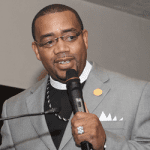Wheaton College grad Cathleen Falsani asks, "Is Evangelical Christianity Having a Great Gay Awakening?"
That's an optimistic question, and Falsani wants to give an optimistic answer. "A growing number of evangelical leaders," she writes, are publicly refusing to categorize homosexuality as a sin.
As an example of this rising tide, she cites Jay Bakker, son of former televangelists Jim and Tammy Faye, and now pastor of The Revolution church in New York. I first met Jay years ago at Cornerstone and liked him immediately. He wears his scars on his sleeve — a wounded and damaged man who is zealously protective of others who have been wounded or damaged, and who is fiercely determined never to contribute to the wounding of anyone else.
Jay's theology is shaped with the imprint of AA and its desperate reliance on amazing grace. Grace is the theme, again, of his next book — Fall to Grace: A Revolution of God, Self and Society — in which, Falsani says, he writes:
"The clobber scriptures don't hold a candle to the raging inferno of grace and love that burns through Paul's writing and Christ's teaching. And it's a love that should be our guiding light."
Those who have been clobbered by those "clobber scriptures" may find Jay's reference there to "Paul's writing" strange, since some of those clobber scriptures are plucked out of Paul's letters. They had to be plucked out — excised, extracted — because leaving them where they sat, in their original context amidst Paul's relentless theme of the triumph of grace, grace, grace would not allow them to be used as weapons.
The fans of those "clobber scriptures" will surely try to clobber Jay for saying this. They will accuse him of saying, "Let us sin, then, that grace may abound" — thereby applying to Jay the same distorted caricature that the Apostle Paul said his critics were applying to him. And Jay's accusers will, in general, carry on as though everything the Apostle Paul ever said supports their claim that the law triumphs over grace, as though this were what he called "the most excellent way," as though he had written, "And there abide these three: sin, duty and law, and the greatest of these is law."
Makes you wonder if these people have ever even read the Bible.
Sadly for Falsani's "Great Awakening" thesis, she has a hard time coming up with additional examples of this "growing number of evangelical leaders." She cites Tony Jones, a Minnesota church leader (with an interesting blog), and Peggy Campolo. I'm not sure that three voices constitutes a new wave — particularly since Peggy, God bless her, has been saying the same thing since the 1980s.
Falsani concludes:
Only time will tell whether more evangelical leaders … will add their voices to the chorus calling for full and unapologetic inclusion of homosexuals in the life of the church.
But I'm sensing a change in the wind (and the Spirit).
Hope she's right.
* * * * * * * * * * * *
The Tennessee Tea Party has some demands for changing the education curriculum in their state:
No portrayal of minority experience in the history which actually occurred shall obscure the experience or contributions of the … majority.
So, OK, then. No more looking at history through the lens of "minority experience." Time to focus on "the majority."
No more of this obsession with kings and nobles — put the focus where it belongs, on the serfs and the peasants who made up the vast and overwhelming majority of the population.
Set aside the generals and conquerors and put the focus on their victims — the foot soldiers and the civilians who make up the majority in any war.
Forget this preoccupation with the minority experience of the wealthy plantation owners. History should be taught with an emphasis on the much larger number of people who were treated as non-people and — thanks to minority-rule in the Involuntary Volunteer State — were raped, beaten, kidnapped and tortured with impunity.
Who knew the tea partiers were such big fans of Howard Zinn?
* * * * * * * * * * * *
Frederick W. Schmidt takes on Left Behind and Harold Camping's comeback attempt. It's familiar ground for those of us who've been reading the World's Worst Books a bit more closely, but he has some nice things to say about rapture-mania and the fear of death and how "the stories we tell shape our souls."
And I especially liked this bit on the supposed orthodoxy of Tim LaHaye's abuse of the book of Revelation:
Far too many people assume that the "left behind" approach to scripture is the only orthodox approach to some parts of scripture and yet it is neither the only approach available, nor is it particularly orthodox.
In fact, it doesn't even make a great deal of sense to read the book of Revelation as if it were a roadmap to current events. … It is counterintuitive, if not just simply strange, to read as if over two millennia ago in Asia Minor, a Greek-speaking writer wrote to a Greek-speaking congregation, and upon reading it, they concluded, "We don't have any idea what it means, but people living two thousand years from now on a continent that has yet to be discovered, in a country that has yet to be founded, living under circumstances no one can now imagine, speaking a language that has yet to develop will understand it."
That strange and counterintuitive reading is, of course, what Tim LaHaye calls "literal."
* * * * * * * * * * * *
Michelle Goldberg in The Daily Beast on "The Cult Web Film that Inspired Loughner":
People who study the right have worried for months about the consequences of paranoid beliefs about treasonous government plots. In 2009, [Chip] Berlet authored a report titled, “Toxic to Democracy: Conspiracy Theories, Demonization and Scapegoating.” It traced the history and dissemination of the kind of conspiracy theories floating around the right, and said, “People who believe conspiracist allegations sometimes act on those irrational beliefs, and this has concrete consequences in the real world.”
[Arizona shooting suspect Jared] Loughner was caught up in the sort of conspiratorial fantasy Berlet was describing. His YouTube videos are often unintelligible, but in their moments of lucidity, they rail against manipulation of the currency system and the illegitimate power of the federal government, obsessions of the right-wing populist milieu. In this milieu, politicians like [Rep.] Gabrielle Giffords weren’t simply wrong, they were agents of an intolerable tyranny manipulating the economy and turning Americans into slaves. Hence the vitriol and intimations of violence that scared Giffords and her staff well before Saturday’s shooting.
The point, again, is not that Alex Jones, Zeitgeist or the tea party are responsible for Loughner’s crimes. The point is that he targeted Giffords for a reason, one rooted in his unhinged interpretation of recognizable conspiracy theories. Right-wing activists and politicians have traded on such theories, giving them far more mainstream exposure and credibility than they ever had before. Experts on political violence have been arguing for months that this is extremely dangerous. People like Loughner are the reason why.















